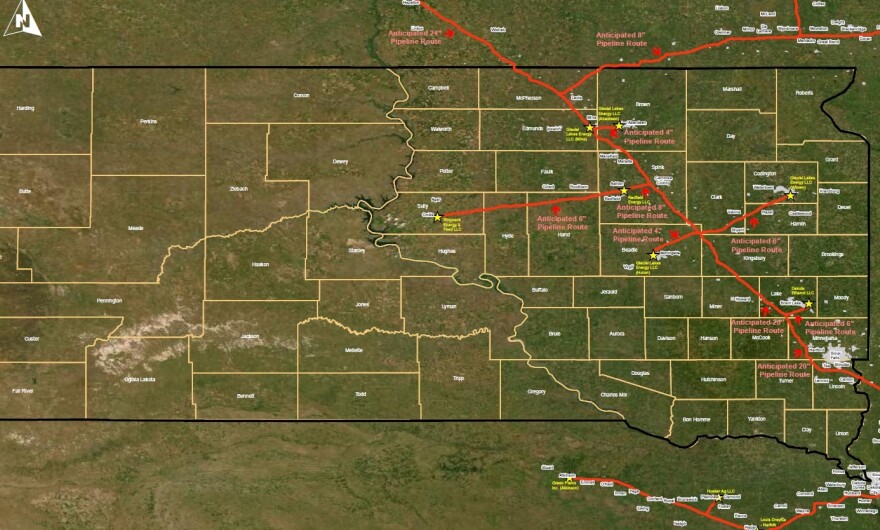An Iowa company wants to capture carbon dioxide from seven South Dakota ethanol plants and transport the emissions through 459 miles of pipeline before storing it in North Dakota.
The Midwest Carbon Express project would bring C02 from 31 ethanol plants from the Dakotas, Minnesota, Nebraska, and Iowa to an underground storage center near Bismark.
"This would be the largest carbon capture and storage project in the world," said Jesse Harris, a spokesman for Summit Carbon Solutions. "This is about the capacity of capturing and safely storing up to 12 million tons of C02 on an annual basis. That's the equivalent of removing about 2.6 million vehicles off the road every year."
Harris said the project would also be a win for the corn and ethanol industries, which could earn more money by selling fuel to markets with low-carbon standards. Those markets include California, Washington, and Oregon.
Summit Carbon Solutions has not yet applied for any permits with the Public Utilities Commission. But it's holding public meetings Tuesday and Wednesday in four of the communities the project will pass through, according to a letter sent to landowners and tenants obtained by SDPB.
The company will provide this handout to attendees and hopes to eventually gain voluntary easements, Harris said. Land agents are already visiting landowners to ask for permission to survey their properties.
Dan Lederman, who also serves as chair of the South Dakota Republican Party, is a consultant for the company who has been meeting with legislators and local government bodies about the project, Harris said.
The carbon capture process would begin at the ethanol plants, Harris said. Infrastructure would capture the gas before it ever hits the air and compress it into a mostly liquid substance.
That liquid would then move through pipelines that are at least four feet underground and range from four to 24 inches in diameter, Harris said. None of the pipelines cross through South Dakota reservations but the company has reached out to area tribes.
The liquid would eventually arrive near Bismarck where it would be permanently stored underground.
Harris said the company will be able to track changes in pressure and possible leaks from its headquarters in Ames, Iowa. C02 is not flammable but can harm or kill humans.
Someone could be harmed if they happened to be standing next to the site of a gas leak, Harris said. He said there have been no C02 pipeline-related deaths in more than 20 years.
Harris said the company would like to begin construction by 2023 and be operational by mid-2024.
Dakota Rural Action, a South Dakota-based group, has concerns about the project, said director Frank James.
"The basic problem that we have is that the eminent domain process in South Dakota is so lopsided toward the industry trying to develop that people feel that they are not even represented in the process," he said.
DRA and its members also have questions about the safety and environmental aspects, James said.
The Iowa Sierra Club opposes the project, saying it doesn't address the root cause of climate change. Some landowners and environmentalists in the project area also have concerns, the Associated Press reported in July.
Summit Carbon Solutions held meetings in Aberdeen and Redfield on Tuesday. It's meeting at the Dakota Prairie Playhouse in Madison from noon to 2 p.m. on Wednesday. It meets at the Prairie View Event Hall in Tea from 5:30 p.m. to 7:30 p.m.
Summit Carbon Solution was formed in 2020 but is affiliated with Summit Agricultural Group, which was formed in 1990. The parent company operates in the United States and Brazil and describes itself as a "diversified agribusiness operator and investment manager."


